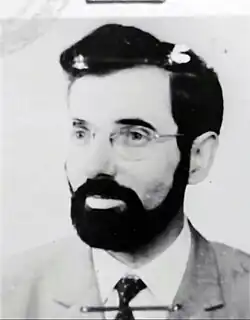Czesław Śliwa
Czesław Śliwa | |
|---|---|
 | |
| Born | Jacek Silber July 3, 1932 |
| Died | 18 November 1971 (aged 39) |
| Other names |
|
| Occupation | con artist |
Czesław Śliwa (born Jacek Silber 3 July 1932 – November 18, 1971) is a Polish con artist, forger and a fake Austrian consul. He was also known by aliases Jack Ben Silberstein and Jacek Zilbercfaig.
Early life and endeavors
He was born in Rzeszów in the Second Polish Republic to a Jewish family. His father owned a distillery as well as a farm in Błażowa next to Rzeszów. During the Nazi occupation, his parents placed him in the care of their acquaintance named Śliwa, who was hiding him until the end of World War II using fake documents for the name "Czesław Śliwa".
He completed secondary education but did not pass Matura exam and thus began employment as a tailor in Bytom. He was using a forged master's degree diploma copy in textile engineering issued in the name of Jacek Elizeusz Zilbercfaig. He later moved to Wałbrzych, where, with the help of forged documents, he found employment as a mining rationalizer and expert. In 1958, he got married. At the wedding, he illegally appeared in a mining engineer uniform, which drew the attention of the Citizens' Militia. He was soon arrested and subsequently sentenced to 7 years in prison, although he was released as a result of an amnesty in 1964.
Fake consulate
At the beginning of September 1969, with the help of 8 other people (a local taxi driver, two hairdressing students, one pedagogy student and a family of three Greek immigrants specializing in sheep farming, as well as another Greek friend of theirs), he organized a fake consulate general of Austria in Wrocław, declaring himself as its head. The temporary headquarters of the "consul" was located in the Monopol hotel in Wrocław, where he rented a room for half a year under the surname Silberstein, assuring the embassy of Austria is going to pay for it. He managed to obtain fake seals, prepared for him by an employee of a stamp shop solely on the basis of a Silberstein consul's business card. Seals imitating Austria's national emblem were made by himself, using other emblems with a double-headed eagle. Similarly, he also ordered official forms from the printing house.
Substantial financial rewards were promised to his collaborators, whom he was also issuing fake documents certifying appointments to the positions of consul's driver, consulate general secretary, economic attaché, and so on. In reality, these people were deceived too, as they would lend the fake consul money and provide him with unpaid services. Śliwa/Silberstein, together with the "consulate staff" would regularly travel around Poland in search of his next victims. Because of his skills in document forgery and exceptional charisma, he managed to deceive local authorities that started preparing for the opening of a new diplomatic mission, emptying one of the kindergartens for that purpose. Śliwa/Silberstein also submitted his credentials (poorly written on a torn-out notebook page with a pencil) to the Office of Council of Ministers at the State Council headquarters.
His activities were then noticed by the Security Service, which nevertheless decided to arrest him only after the embassy of Austria protested against the payment to the Monopol hotel after they were contacted in that matter. Śliwa was arrested for the second time on November 28, 1969. Even after being detained, he demanded to be referred to as Silberstein and claimed to be Austrian (which was quickly disproven as Śliwa did not understand questions he was asked in German). Moreover, Śliwa attempted to convince the investigators that he is a Western spy who was tasked with the creation of an intelligence network consisting of people of Jewish heritage. At the same time, still in custody, he was sending letters to his victims, trying to extort additional funds "to cover attorney fees", all the while maintaining that he is an Austrian consul and the arrest was a mistake.
Despite the authorities' appeals, victims of Silberstein's fraud were reluctant to report to the police, fearing liability, mainly for illegal trading in foreign currencies. Those victims who showed up to testify during the trial – as noted by the observers – usually showed no animosity towards Śliwa. Śliwa did not have a defense attorney, he represented himself and demanded to be referred to as Silberstein the entire time. After a trial lasting only four days, he was found guilty by the verdict of the Wrocław district court of June 9, 1970, of fraud of over half a million złoty and sentenced to 7 years' imprisonment and a fine of 200 000 złoty (changed to 3 additional years in prison). Lefteris Conis, who was tried with him, was sentenced for foreign exchange crimes to 2 years' imprisonment, suspended for 5 years. Another collaborator, 19-year-old Janina Sikorska (born 1951), received a one-year prison sentence suspended for 4 years for presenting false documents.[1][2]
Imprisonment and death
During his stay at Wołów penitentiary Śliwa devoted himself to writing of patriotic poems, especially praising the communist regime and the state leaders. He wrote a couple hundred of them, most likely in an attempt to appease the government so that he could finish his sentence earlier.
He died in the penitentiary in unclear circumstances. According to one version, he was trying to coerce the prison staff to move him to a better facility by swallowing a metal object in order to simulate tuberculosis but died due to complications. He was buried at the Osobowice Cemetery in Wrocław. In 1994, his tomb was removed due to lack of payments.
References
Bibliography
- Maciejewski M., 2005, Ja dyplomata obcy ambasada, [w:] Akta W, Wrocław.
- Osowicz E., Prawdziwe kłamstwa konsula, prw.pl